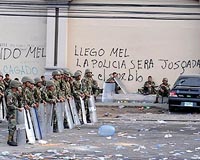| . |  |
. |
London (UPI) Apr 27, 2010 An international trade court ordered Britain to pay Iran $650 million for failing to deliver some 1,300 tanks after Shah Mohammad Reza Pahlavi was toppled in the 1979 Islamic revolution, officials said. That marked a propaganda victory for Iran as it braces for the United States and its allies to secure a new round of economic sanctions on it for refusing to abandon its nuclear program. But Tehran won't gain any material benefit from the ruling by the court in The Hague. With financial restrictions imposed by the European Union on Iran's banking system, the funds the British government has been ordered to pay will automatically go into a trust account overseen by independent trustees that contains frozen Iranian assets. Some $1.57 billion in Iranian assets had been frozen in Britain before the court announced its ruling. Thus ended a bizarre legal battle which was fought over 30 years largely behind closed doors in the arbitration court of the International Chamber of Commerce in The Hague with little public knowledge. The settlement is between International Military Services Ltd, the state-owned company used by Britain's Defense Ministry that concluded the Chieftain deals in the 1970s, and Iran's Ministry of Defense. Britain's The Independent newspaper noted that the settlement "will bring to an end one of the more tortuous and murky sagas in that most opaque and scandal-riddled area of international affairs -- nation-to-nation arms deals." In the 1970s, the shah's government was favored by the United States and Britain as a vital bulwark against Soviet expansion to the strategic oil-rich Gulf. From 1971-76, his government ordered 1,500 Chieftains and 250 FV2404 armored repair vehicles, which retrieve damaged tanks from the battlefield, all manufactured by the Leyland Co. and Britain's state-owned Royal Ordnance Factories. At that time, the FV4030/1 Chieftain was Britain's primary main battle tank. When it was unveiled in 1967 it had the most powerful main gun of any tank in the world -- the 120mm L11A5 rifled gun that could fire eight rounds a minute -- and the heaviest armor. The contracts were worth 650 million pounds, today worth around $1.04 billion, and were paid in full in advance from the shah's treasury, then overflowing thanks to Iran's oil wealth. Those funds were crucial in keeping Britain's defense industry going at a time of slumping sales. But by the time the shah was toppled in January 1979 and went into exile, Britain had delivered 187 of the 55-ton FV4030/1 Chieftains, which the Iranians dubbed Shir-1. The British halted deliveries to what was deemed a hostile regime in Tehran headed by the Ayatollah Ruhollah Khomeini after the U.S. Embassy in Tehran was stormed by his followers on Nov. 4, 1979. Fifty-three U.S. diplomats and others were held hostage for 444 days, wrecking any prospect of the Chieftain deal being revived. The fundamentalist regime demanded Britain return money paid for the undelivered tanks. London refused. The abrupt cancellation of the Chieftain contract, as well as the loss of other anticipated lucrative defense deals with the shah's government, caused near-panic in Britain. In the words of one senior IMS official at the time, the Ministry of Defense was "faced with the nightmarish prospect of wholesale redundancies and disorganization within (the arms industry). As a result, there was imminent danger of the partial collapse of a significant sector of the U.K. defense industry, with the attendant political and industrial consequences." Margaret Thatcher, Britain's prime minister at the time, quietly sold 279 of the Chieftains to Jordan and 29 of the armored recovery vehicles to Saddam Hussein's regime in Iraq just before he invaded Iran in September 1980, triggering an eight-year war. The Iranian Embassy in London declined all comment on the settlement. But Professor Ali Ansari, an expert on Iran at the University of St. Andrews in Scotland, told The Independent, "Any debtor will always drag their feet but London has dragged this out spectacularly." Iran has similar claims pending against the United States. "I suppose this shows the tenacity of Iran on these matters. They really do not let this things go," Ansari said.
Share This Article With Planet Earth
Related Links The Military Industrial Complex at SpaceWar.com Learn about the Superpowers of the 21st Century at SpaceWar.com
 Brazil plans an armed force of 500,000
Brazil plans an armed force of 500,000Sao Paulo (UPI) Apr 27, 2010 Brazil is on course to have a standing army of half a million men and women as part of its military regeneration program that includes commissioning a nuclear-powered submarine. Plans for increasing the country's voluntary force from about 300,000 at present to 500,000 are being pursued as part of President Luiz Inacio Lula da Silva's vision of Brazil asserting its presence as an influe ... read more |
|
| The content herein, unless otherwise known to be public domain, are Copyright 1995-2010 - SpaceDaily. AFP and UPI Wire Stories are copyright Agence France-Presse and United Press International. ESA Portal Reports are copyright European Space Agency. All NASA sourced material is public domain. Additional copyrights may apply in whole or part to other bona fide parties. Advertising does not imply endorsement,agreement or approval of any opinions, statements or information provided by SpaceDaily on any Web page published or hosted by SpaceDaily. Privacy Statement |